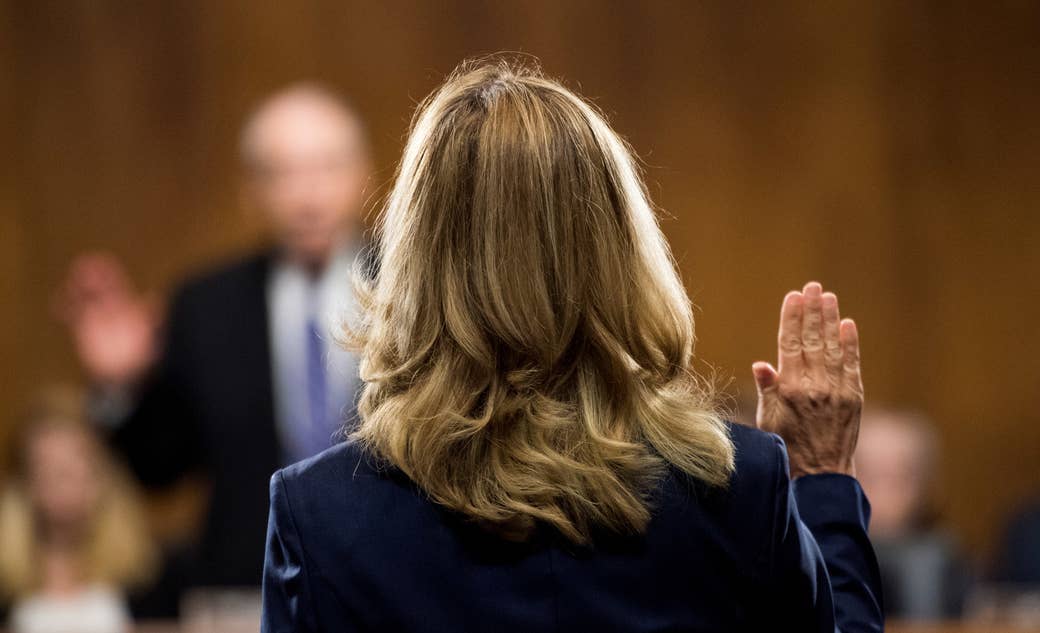
“Does that work for you as well?” Christine Blasey Ford asked Sen. Chuck Grassley, trying to figure out when she was allowed to take a break from testifying about her sexual assault in front of a Senate committee and the nation. “I’m used to being collegial.” Earlier in her testimony, Ford explained that she “truly wishes” she “could be more helpful” in remembering more details of what happened to her 36 years ago. Ford told the committee, “I am here because I believe it is my civic duty to tell you what happened to me.” She came forward with her account of her assault because she wanted “to be helpful.”
Periodically throughout her testimony, while enduring questioning in granular detail about her memories by sex crimes prosecutor Rachel Mitchell, Ford apologized for small inaccuracies, attempting to correct the record — things like her exact usage of the word “bystander” — to be as precise as possible. As Cynthia Alksne, a former federal prosecutor offering commentary for MSNBC, put it during the first recess: “She is so careful and trying so hard to be accurate and fair.”
For many, Ford has emerged as a credible and believable authority on her own trauma and the events that led to it. But millions of others are still litigating the notion that she is a Democratic operative, that she’s being paid, that she is willingly torpedoing her life in order to retraumatize herself on national television. Regardless of whether the Senate votes to confirm Judge Brett Kavanaugh’s nomination to the Supreme Court on Friday, Ford’s testimony and the discourse that’s swirled around her claims for the past two weeks points to two infuriating realities: that women are largely not considered reliable narrators of their own experiences, bodies, memories, and relationships, and that the bar remains impossibly high for a woman to be believed.

Many women are so accustomed to not being trusted with their own interpretation of their bodies, their pain, or their workplace experiences that we don’t realize what a doctor’s visit, or a visit to HR, or even an account of a breakup would be like if we were presumed, by the people listening to us, to be rational or “credible.” For centuries, women have been conceived of as overly emotional, overly sensitive — irrational or unreliable in comparison to men. The stereotypes flow from there: Women cry, men don’t; women act with their hearts, men with their minds; women become hysterical, men remain calm; women can’t be trusted, men can. Of course, there are larger stakes in positioning women in this way. Often, moments of so-called hysteria occur when women protest, become overwhelmed by, or otherwise refute their position under patriarchy. The best way to discount and delegitimize that resistance? Call it irrational, and call the women crazy.
Traditionally, in order to legitimize themselves — in the public sphere, in the workplace — women have stripped themselves of these hallmarks of stereotypical femininity. The first waves of women in their fields — of medicine, of academia, of politics — were distinguished and praised for their reserve, their professionalism, code words for their lack of conventionally accepted feminine characteristics. To make themselves as unimpeachable as possible, as qualified as possible, they had to be as much “like men” as possible.
My pediatrician was one of these women. My PhD adviser was one of these women. I remember mistaking their matter-of-factness for coldness. But it wasn’t coldness; it was necessary armor. It was an armor worn by Anita Hill as well, who bore the additional burden of proving herself to be capable and legitimate in comparison not only to her male counterparts, but to her white ones as well. That burden was on display in her 1991 testimony of being sexually harassed by Judge Clarence Thomas.
But that confidence, that steeliness, that unflappable professionalism — to the white male senators hearing her testimony, and much of the audience watching the hearings — that made Hill an aberration, and a threat. And, as such, she was deemed “unsympathetic,” a feeling amplified, however implicitly, by her blackness.

To be considered a reliable narrator — and, in these cases, a believable victim — a woman must demonstrate model victimhood. She must be feminine — which is to say, she must look like what our nation has decided femininity looks like at any given time. She must be emotional, but not hysterical. She must seem meek, and conciliatory. She must be willing to help in whatever way possible. She must exhibit physical and visual signs of trauma. She must seem sympathetic.
In her testimony, Ford has been — as far as anyone can possibly tell, authentically, and not performatively — all of those things. She wants, above all else, to be helpful. Her voice is high and slight and feminine. Sen. Orrin Hatch called her “an attractive witness” and “pleasing.” She laughs, however timidly, at nervous attempts at humor. The perceived contrast with Hill is stark: “Anita Hill projected strength, and control, and a real professionalism to match Judge Thomas,” CNN commentator Joan Biskupic said during the hearing. “The vulnerability [of Ford] is coming through much more. You feel her reliving it.” For centuries, our nation, across the political spectrum, has internalized the notion that a vulnerable woman — specifically, a vulnerable white woman — should be protected.
Ford’s story is consistent. She fits the dominant understanding of how a victim of sexual assault should conduct herself. That’s part of what analysts are referring to when they call her “credible.” But they’re also referring to other characteristics of Ford that render her a credible authority on her own experience. When introducing her, Sen. Dianne Feinstein outlined Ford’s educational history, including the schools where she received her various degrees. Her education, particularly the quality and exclusivity of the institutions she attended, is used to increase her credibility. When Ford herself described her memories, she invokes the scientific language in which she was trained. While recounting the way she says Brett Kavanaugh and Mark Judge laughed at her while she was being forcibly pinned down on a bed, she said “indelible in the hippocampus is the laughter. The uproarious laughter.” She became, in essence, an expert witness on her own trauma.
Ford’s memory of that laughter — the way she was humiliated — should be damning enough testimony when it comes to calling into question the appointment of a candidate to the most influential court in the nation. But that statement, one of many that will become iconic from Ford’s testimony, is so powerful because it combines the invocation of shame and vulnerability with the authority of scientific expertise. It the best-case scenario of credibility: She is completely normal, a textbook “girl next door.” She has not threatened the societal order; instead, she has labored to excel within it. And yet she has the fortitude to come forward and to speak about her experience using precise, persuasive language. She has achieved what Brian Williams, speaking on MSNBC, termed “extraordinary ordinariness.”

Her credibility is such that even Chris Wallace, on Fox News, proclaimed she “doesn’t sound like a Democratic operative.” At the lunch recess, my mom, a woman 10 years Ford’s senior and a longtime academic, sent me a text. “[Ford] is the epitome of a woman academic who has made her way through extreme competence and intelligence,” she said. “And not pissing the men around her off.” It’s a devastating encapsulation of what is required of women today — not just to excel in their field, but to have their basic perception of reality accepted by others. They must be competent. They must exhibit intelligence, which is to say, exhibit a certain class position. And they must not say anything, or comport themselves in a way, that could anger a man. Above all else, what a woman claims — and how she claims it — must not jeopardize the existing, patriarchal order.
It’s a profound statement on the position of women that the only way for a woman’s account of sexual assault to be believed is if she, and the account itself, becomes as amenable, as unthreatening to men, as possible. Ford may have proven herself — to the handful of senators who could swing the confirmation vote, and to millions of Americans watching — to be a credible witness to, and narrator of, her own trauma. But through no fault of her own, she has also reinforced the incredibly high bar of believability. Ford is white, upper-middle class, married, and highly educated. She is calm but demure. She is visibly shaken yet steady. She could afford the therapy that helped document her psychological past. She has a support system and the means to hire a lawyer.
Imagine if you lack even one of these qualities. Imagine if your behavior, or your voice, or your face, or the life you’ve lived doesn’t perfectly match what is demanded of the ideal victim. Would you be believed? ●
